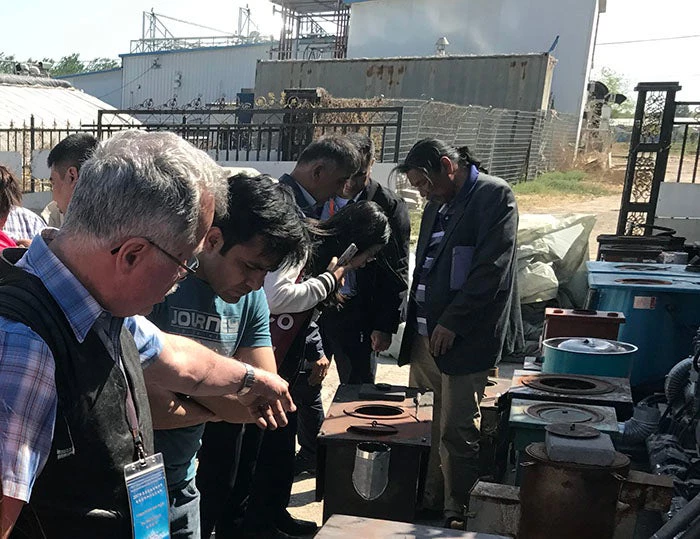
Places with cold climates need access to a reliable and efficient heat supply for the health of their population. But in developing countries, the majority of rural and peri-urban households do not have access to centralized heating or gas networks. Instead, they use traditional heating stoves that use solid fuels like coal, wood, and dung for heating. These stoves are often inefficient (with thermal efficiency as low as 25%-40% compared to 70% or above for efficient stoves) and emit large amounts of pollutants (e.g., CO and PM2.5), causing indoor and outdoor air pollution with negative health and environmental impacts.
For example, measurements conducted as part of a pilot project on efficient and clean heating stoves in Kyrgyzstan implemented during the 2016/2017 heating season showed that PM2.5 emissions reach levels of up to 11.5 mg/m 3 during ignition and refueling. As a reference, WHO Air Quality Guidelines for the annual mean of PM2.5 concentration are 0.01 mg/m 3. Over half of the children and adults surveyed for the pilot project had coughs, headaches and other discomforts, especially after igniting and refueling the stoves. Women and children who spend more time at home are particularly affected by indoor air pollution.
The low thermal efficiency of traditional heating stoves means that more fuel is needed (and more carbon emissions if coal is used) and households have higher fuel expenses. A recent survey conducted in Tajikistan shows that the rural households on average spend up to 15% of their total budgets on energy during the heating season.
Insufficient heating in homes with already cold indoor temperature is also common. According to a recent article from the Lancet, most temperature-related deaths are attributable to cold temperature.
From April 17-19, government officials and experts from China, Mongolia, Kyrgyzstan and Tajikistan were brought together to share their experiences at the Clean and Efficient Heating South-South Knowledge Exchange Event. These countries are working with the World Bank to find clean and efficient heating solutions that include the use of clean stoves. Although each country has its own characteristics, they often face similar institutional, technical, and financial challenges, and can learn from each other’s example.
The event was organized in conjunction with China’s 11th Clean Stove Expo. China has the largest clean stove industry in the world and has implemented various government-supported clean stove programs. The event was supported by the World Bank’s Energy Sector Management Assistance Program (ESMAP), and was organized by the Bank and the Rural Energy and Environment Agency under the Ministry of Agriculture and the China Agricultural University.
Hundreds of manufacturers showcased their products, providing a good opportunity for participants to see the latest in the Chinese clean stove industry. A forum was also organized for participants to learn about the latest developments in stove technology and discuss common issues such stimulating household demand, supporting supply side development, designing incentive mechanisms, and developing more effective supporting policies.
Some of the key takeaways from the event include:
- Country programs need to be designed with their particular needs and challenges in mind. Although all heating solutions should aim for being clean, efficient, convenient, and affordable, priorities may be different based on the country context. In the case of China and Mongolia where ambient air pollution has been a major issue, cleanliness should be prioritized and rigorous standard and testing procedures for PM2.5 emissions have been developed for their stove programs. In the case of Tajikistan and Kyrgyzstan where poor households’ under heating and energy poverty has been a main concern, efficiency and affordability need to be prioritized.
- The solutions for clean and efficient heating require matching fuel and heating devices. Recent developments in stove technology offer an opportunity to transform the sector. Smoke is unburned fuel. If fuel can be burned completely, there will be no smoke. The recent stove technology development including the stove prototypes piloted in Kyrgyzstan and Tajikistan shows that heating stoves using solid fuels can be very clean. Lab tests show that these stoves have very low or, even negative, emissions, which means that stoves are cleaning the air as it burns the fuel.
- While countries need to push their industries to introduce new technologies and stimulate demand, they must be careful not to distort the market. A phased strategy with gradually reduced incentives may be appropriate. Experiences from both China and Mongolia show that subsidies to reduce stove prices for households play a key role in introducing new technologies and achieving rapid market penetration. However, high level of subsidies could change household expectations, hurt local producers, and lead subsidy leakages, as Mongolia has experienced. Awareness raising and information campaigns are also effective in stimulating demand.
- Developing local production capacity is crucial to transform the clean stoves market. Except for China, artisan producers currently dominate Mongolia, Tajikistan, and Kyrgyzstan. These producers require support on how to design clean, higher quality, and lower cost stoves, and working capital and investments on equipment to scale-up production. Due to the small market size, large-scale industrial production in these countries may not be the best solution. Upgrading artisan producers by encouraging joint ventures and introducing prefabricated parts to kick off production may be a good approach. Setting up an association for self-regulation, technical improvements, and quality control has also proven to be an excellent way to facilitate market transformation.
You can find all event materials including the agenda, the list of participants, country project descriptions, presentations, and videos here .
The South-South knowledge exchange event was made possible and benefitted from the efforts of Han Na, Zhou Yuguang, Shen Lidan, Akylai Osmonalieva, and Farangis Dakhte.


Join the Conversation